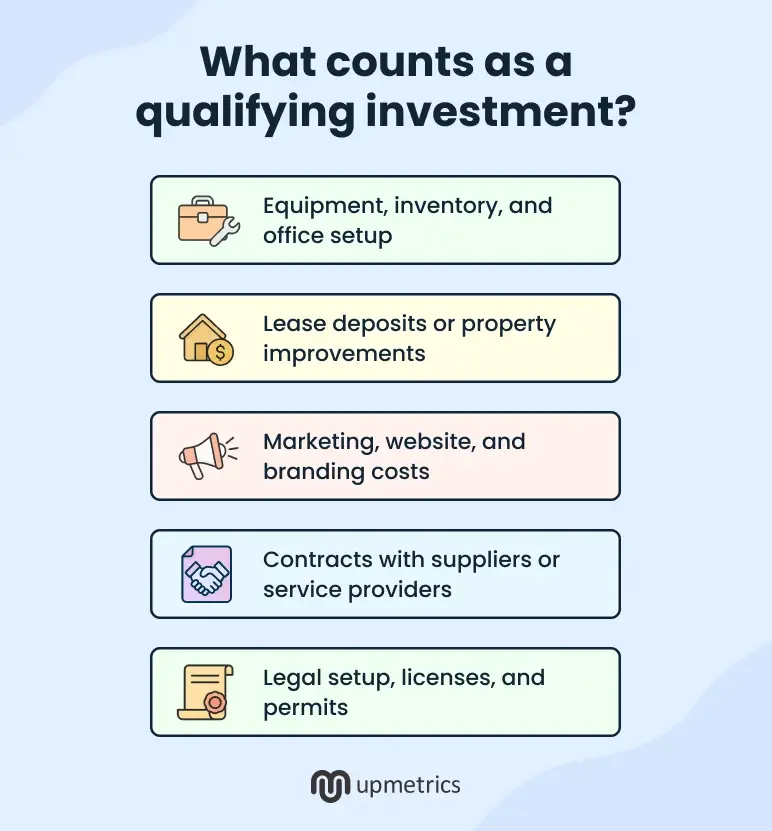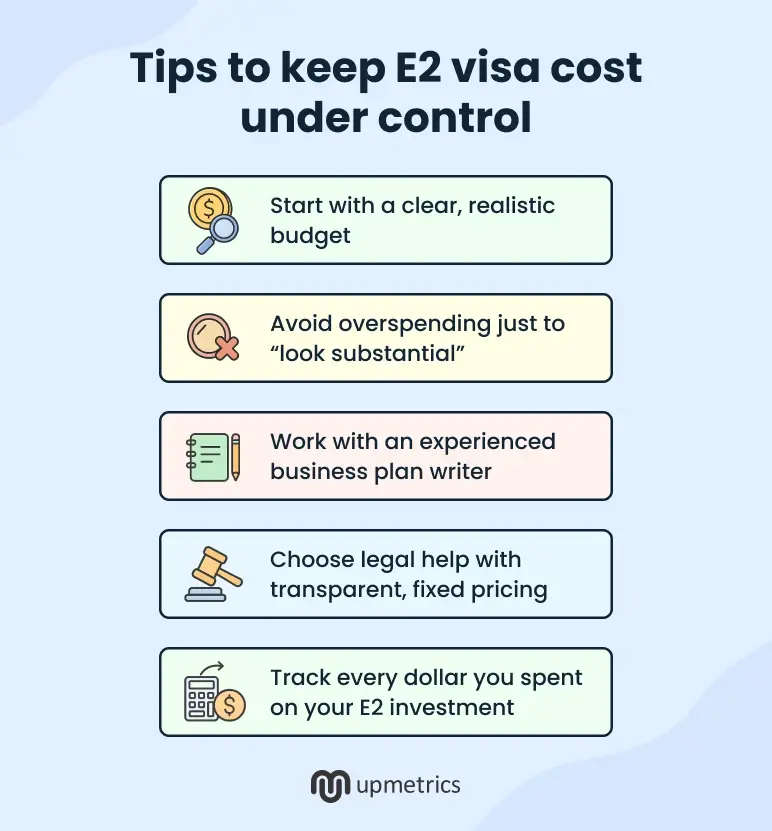How much does it cost to get an E2 visa? Short Answer 👉🏼The E-2 visa entails a significant financial commitment, both in business investment and application costs.
Generally, you should be prepared to invest at least tens of thousands of dollars into your U.S. business (often $80,000–$200,000 or more), plus pay several hundred dollars in government fees for each visa applicant.
If you opt to hire an immigration attorney or other services (like a professional business plan writer or translators), those professional fees will add a few thousand dollars on top.
The good news is that with careful planning and budgeting, you can estimate the total E-2 visa cost upfront and avoid surprises. Below, we break down all the major expenses – from official filing fees to the investment itself – so you know what to expect.
How much does an E2 visa cost?
The standard cost of an E2 visa that our industry competitors charge is around $150,00 to $500,00 for consulting and $5,00 to $2,000 for business plan writing services.
Here’s a clearer look at what makes up the total E2 visa cost:
| Cost Category | Amount Range |
|---|---|
| Government filing fee | $300–$500 |
| Visa consulting services | $15,000 – $50,000 |
| Business plan writing | $5,00 – $2,000 |
| Legal representation | $5,000 – $15,000 |
| Minimum investment required | $100,000 – $200,000 |
| Document preparation | $1,000 – $3,000 |
| Consular processing | $500 – $3,000 |
Total Professional Costs: $24,405-$81,905 (excluding the actual business investment)
Remember, these are just ballpark figures. The exact cost can vary based on your specific situation, the complexity of your case, and the region you are applying from. To give you a proper quote, we’d need to understand your E2 visa requirements in detail first.
Because without knowing about your business, your industry, and your plans, it’s difficult to give an exact estimate. The cost depends on the type of services you’ll need, and all of these can vary from person to person and industry to industry.
So, to get a realistic cost estimate, you can either send us your details and requirements or connect with one of our experts who can understand your situation and guide you properly.

What is the cost of obtaining an E2 visa? Detailed breakdown
If you’re considering applying for an E2 visa, it’s important to understand the different costs involved upfront. These expenses typically fall into two categories: Official government fees (which are mandatory) and legal or service costs (which are optional but often recommended). Let’s break it down.
Official government fees
These are mandatory, non-refundable fees that the U.S. government requires from every E2 visa applicant. Whether your application is approved or denied, you won’t get this money back, so it’s essential to be aware of them before starting.
Here’s a breakdown of the required government fees:
DS-160 visa application fee
This is the standard E-2 visa application fee (also called the MRV fee). It’s $315 per person for a treaty investor visa. This fee covers the basic processing of your visa application and must be paid before you can schedule your consular interview.
Form DS-156E (Treaty Investor Application)
If you’re applying as a Treaty Investor principal applicant, you typically only need the DS-160, but executives, managers, or essential employees may also need to complete the paper DS-156E form.
The DS-156E itself doesn’t carry an additional fee, but it adds complexity to your application preparation.
Visa issuance fee
The visa issuance fee varies significantly based on your country of citizenship and operates on a reciprocity principle. For example, citizens of Japan typically pay around $105, while UK citizens pay $0 for this particular fee.
Premium processing fee
If you’re already in the United States and filing a Change of Status petition with USCIS, you have the option to pay an additional premium processing fee of $2,805.
This can accelerate USCIS decision-making to within 15 calendar days rather than waiting months for standard E2 visa processing time.
These government fees are fixed costs that apply to all applicants and represent the minimum financial commitment required to pursue an E2 visa.
Legal and service costs (If you hire help)
While professional assistance isn’t legally required for E2 visa applications, the process of E2 involves numerous complex requirements where mistakes can lead to expensive delays, requests for additional evidence, or outright denials.
Hiring professionals can help you avoid delays, mistakes, and potential denials. Here’s what you might spend if you decide to get professional assistance:
Immigration attorney fees
Expect to pay anywhere between $3,000 to $7,000+, depending on the attorney’s experience, your business type, and how complex your case is. Some firms offer fixed packages, while others may bill hourly.
Business Plan Writing
A good business plan is a critical part of an E2 visa application. Costs typically range from $500 to $2,000. However, this cost difference often reflects significant quality variations. Submitting a poorly written or incomplete plan can lead to delays, RFEs (Requests for Evidence), or outright denials.
On the other hand, a perfect business plan can lead to smoother approvals and stronger investor confidence in your visa application.
Get USCIS ready in less than a week
Hire experts to write your E2 visa business plan

Translation & Document Certification
If your documents aren’t in English, certified translations will be required. These services usually cost $100 to $500, depending on the number of pages and languages involved.
To qualify for the E2 visa itself, you’ll need to make a qualifying investment in a U.S. business. That’s a key eligibility requirement, and we’ll cover that in the next section.
Note: These fee amounts are approximate, and the actual cost can vary based on several factors.
How much do you need to invest for an E2 Visa?
Here’s something that surprises many people: There’s no fixed minimum investment amount written in U.S. law for the E2 visa. The government doesn’t say “you must invest exactly $100,000” or any specific number. Instead, they use terms like “substantial investment,” which leaves room for interpretation based on your specific business situation.
Most applicants invest somewhere between $80,000 and $200,000.
Going below $50,000 gets risky unless you have a really solid business case and can show actual money spent on setting up your business.
What counts as a qualifying investment?
Here’s the list of qualifying investments that you should take note of:

1) Equipment, inventory, and office setup
These are the backbone of your business operations. Restaurant equipment, manufacturing machinery, office computers, retail inventory, or specialized tools all demonstrate tangible business assets. These purchases show immigration officers that you’re building real operational capacity, not just moving money around on paper.
2) Lease deposits or property improvements
If you’ve paid a lease or deposit for your office, shop, or factory space, it qualifies as part of your E2 investment. Moreover, renovations and improvements made to suit your business needs—like installing specialized fixtures or making structural changes that support your operations—are also considered eligible expenses.
3) Marketing, website, and branding costs
Building your business identity requires upfront investment that immigration officers recognize. Expenses for designing your logo, building a website, running ads, or printing brochures.
4) Contracts with suppliers or service providers
Establishing business relationships often requires upfront commitments that count toward your investment total. Payments made for inventory orders, service contracts, or signed agreements you’ve prepaid for..
5) Legal setup, licenses, and permits
Every legitimate business needs a proper legal foundation. The costs of registering your company, getting business licenses and permits, and paying government fees are all included in the E2 investment cost.
Other costs you might not expect
When people plan for an E2 visa, they often focus on the big-ticket items like investment and legal fees, but there are a few smaller expenses that can sneak up on you. Here’s what you should also keep in mind:
1) Travel costs to attend your interview
You’ll need to visit the U.S. consulate or embassy for your visa interview, which means booking flights, maybe staying overnight, and covering your local transport.
International applicants often underestimate these costs, especially when bringing spouses and children who each need separate interviews. Add a budget of at least $1,000 to $3,000 for travel-related expenses, more if you’re coming from remote locations or bringing a large family.
2) Courier or document handling fees
Sending important documents safely and quickly, both within the U.S. and internationally, can add up, especially if you’re working on tight deadlines. Express shipping for a document package can easily cost $50 to $200, and you might need several shipments throughout the process.
3) Business setup expenses in the U.S.
Don’t forget the cost of registering your business (like forming an LLC or Corporation), applying for business licenses, permits, and covering other local requirements.
Remember, LLC registration fees vary by state, ranging from $50 in some states to over $500 in others like Massachusetts or California. Business licenses add another layer of costs that depend entirely on your industry and location.
4) Ongoing legal or accounting support
Your immigration responsibilities don’t end when you receive your visa approval. You need to maintain compliance with both immigration regulations and business requirements throughout your stay in the United States. These ongoing legal consultations typically cost $200 to $500 per session, with most families scheduling two to three sessions annually.
How to keep your E2 visa costs under control: Tips to follow
Managing your budget wisely can save you from unnecessary stress and delays. Here are a few practical tips to help you stay on track:

1) Start with a clear, realistic budget
List every possible cost you can think of — from legal fees to travel and business setup. Update it as you go. A well-planned budget keeps you prepared and helps prevent last-minute overspending.
2) Avoid overspending just to “look substantial”
Some people think throwing money at unnecessary expenses will impress the consulate—it won’t. Focus your investment on what genuinely helps your business run: equipment, marketing, and hiring. Quality over quantity matters here.
3) Work with an experienced business plan writer
A strong E2 business plan isn’t just about fancy wording—it needs to meet USCIS standards, show job creation, and prove your business is viable. A bad plan can cause delays, RFEs, or denials. Invest in someone who specializes in E2 plans, not generic templates.
4) Choose legal help with transparent, fixed pricing
Ask upfront for a detailed fee structure. Avoid open-ended hourly rates unless necessary. Many experienced immigration attorneys offer flat-fee E2 visa packages—it’s safer and easier to budget for.
5) Track every dollar you spent on your E2 investment
Keep organized records of payments, receipts, contracts, and bank transfers. Not only will you need this for your visa interview, but it’ll also make future renewals and business tax filings much easier.
The bottom line
So, what’s the total price tag of an E-2 visa? In most cases, the majority of your spending will be on the investment in your own business. Think in the range of tens of thousands to a few hundred thousand dollars that you’ll pour into launching or buying the enterprise.
On top of that, you’re looking at roughly $1,000–$5,000 in government and service fees. More if you choose premium processing or expensive attorneys, less if you DIY.
All told, a very minimal E-2 case might be done with around $50,000–$70,000 total (that assumes a low-end investment around $50k, minimal outside help, and basic fees).
Sure, the DIY option might save you some money upfront, but it also increases your risk of rejection. If you make mistakes in your business plan or miss important details, your application can be denied.
That’s why it’s worth spending an extra $2000–$10,000 to have your E2 visa business plan prepared by an expert from Upmetrics. A professional ensures your plan meets all E2 visa requirements, reducing the chances of rejection and giving you peace of mind.


